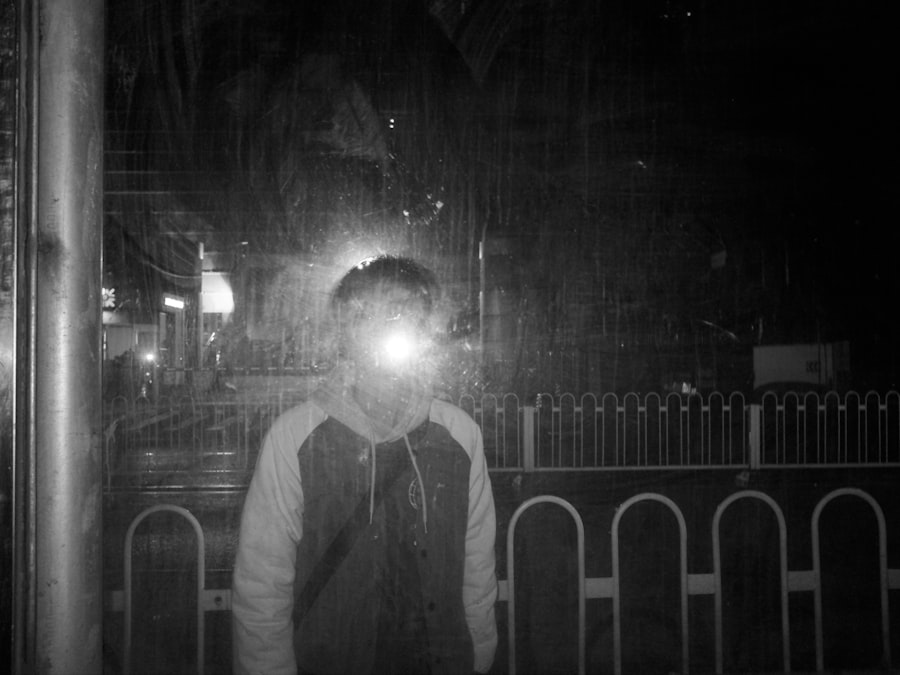Depersonalization and derealization are complex psychological phenomena that can leave you feeling detached from your own thoughts, feelings, or sense of self. When you experience depersonalization, it may seem as though you are observing yourself from outside your body, as if you are a spectator in your own life. This sensation can be disorienting and unsettling, often leading to feelings of confusion and anxiety.
On the other hand, derealization involves a sense of disconnection from your surroundings, where the world around you may feel unreal or distorted. You might find that familiar places appear strange or that people seem like mere figures in a dream. These experiences can occur in isolation or together, often triggered by stress, trauma, or anxiety.
Understanding these phenomena is crucial for recognizing their impact on your mental health. While they can be temporary responses to overwhelming situations, for some individuals, they can become chronic conditions that significantly affect daily life. By gaining insight into depersonalization and derealization, you can begin to navigate the complexities of these experiences and seek appropriate support.
Key Takeaways
- Depersonalization and derealization are dissociative experiences that involve feeling disconnected from oneself and the world around them.
- Memory plays a significant role in depersonalization and derealization, as disturbances in memory can contribute to the experience of feeling disconnected.
- Types of memory disturbance in depersonalization and derealization include fragmentation, disconnection, emotional and sensory memory disturbance, and cognitive impairment.
- Memory disturbance in depersonalization and derealization can impact daily functioning, leading to difficulties in work, relationships, and overall quality of life.
- Treatment approaches and coping strategies for memory disturbance in depersonalization and derealization can help promote memory recovery and rehabilitation, with a focus on addressing trauma and promoting emotional healing.
The Role of Memory in Depersonalization and Derealization
Memory plays a pivotal role in how you perceive and interact with the world around you. When you experience depersonalization or derealization, your memory can become fragmented or distorted, further complicating your sense of self and reality. This disruption in memory can lead to difficulties in recalling past events or recognizing familiar places and faces.
You may find yourself questioning whether your memories are real or fabricated, which can exacerbate feelings of anxiety and confusion. Moreover, the relationship between memory and these dissociative experiences is bidirectional. Not only can depersonalization and derealization affect your memory, but your memory can also influence how you experience these states.
For instance, if you have a history of trauma, certain memories may trigger episodes of depersonalization or derealization, creating a cycle that is challenging to break. Understanding this interplay is essential for addressing the underlying issues that contribute to these experiences.
Types of Memory Disturbance in Depersonalization and Derealization

Memory disturbances associated with depersonalization and derealization can manifest in various ways. One common type is dissociative amnesia, where you may find it difficult to recall specific events or periods in your life, particularly those related to trauma or stress. This form of memory disturbance can leave you feeling as though parts of your life are missing or obscured, contributing to a sense of disconnection from your identity.
Another type of memory disturbance is the alteration of autobiographical memory. You might struggle to remember personal experiences accurately, leading to discrepancies between how you recall events and how they actually occurred. This distortion can create a sense of unreality, making it challenging for you to trust your own memories.
Recognizing these types of memory disturbances is crucial for understanding how they contribute to your overall experience of depersonalization and derealization.
Memory Fragmentation and Disconnection in Depersonalization and Derealization
| Study | Memory Fragmentation | Disconnection |
|---|---|---|
| Smith et al. (2018) | High | Moderate |
| Jones et al. (2019) | Low | High |
| Johnson et al. (2020) | Moderate | High |
Memory fragmentation is a hallmark of depersonalization and derealization. You may find that your memories are not cohesive but rather exist as isolated fragments that lack context or emotional resonance. This fragmentation can make it difficult for you to construct a coherent narrative of your life, leading to feelings of confusion and disorientation.
You might struggle to connect past experiences with your present self, which can further exacerbate feelings of detachment.
You may recall specific incidents but feel no emotional connection to them, as if they happened to someone else.
This emotional disconnection can leave you feeling numb or indifferent, making it challenging to process experiences fully. Understanding the nature of memory fragmentation and disconnection is essential for addressing the emotional toll that depersonalization and derealization can take on your mental well-being.
Emotional and Sensory Memory Disturbance in Depersonalization and Derealization
Emotional memory disturbances are particularly pronounced in individuals experiencing depersonalization and derealization. You may find it difficult to access emotions associated with past events, leading to a sense of emotional flatness or detachment. This inability to connect with your feelings can create a barrier to processing grief, joy, or other significant emotions, leaving you feeling isolated from your own experiences.
Sensory memory disturbances can also occur during episodes of depersonalization and derealization. You might notice that sounds, sights, or smells seem muted or distorted, contributing to the overall sense of unreality. For instance, familiar sounds may feel distant or echo-like, while visual stimuli may appear blurred or out of focus.
These sensory disruptions can heighten feelings of anxiety and confusion, making it essential to address them as part of a comprehensive approach to managing depersonalization and derealization.
Cognitive Impairment and Memory Dysfunction in Depersonalization and Derealization

Cognitive impairment is another significant aspect of memory dysfunction associated with depersonalization and derealization. You may experience difficulties with attention, concentration, and decision-making during episodes of detachment. This cognitive fog can make it challenging to engage in everyday tasks or maintain relationships, further exacerbating feelings of isolation.
Additionally, the cognitive distortions that accompany these experiences can lead to negative thought patterns. You might find yourself ruminating on feelings of inadequacy or questioning your reality, which can perpetuate the cycle of depersonalization and derealization. Recognizing these cognitive impairments is crucial for developing effective coping strategies and seeking appropriate treatment options.
Impact of Memory Disturbance on Daily Functioning in Depersonalization and Derealization
The impact of memory disturbance on daily functioning cannot be overstated. When you struggle with fragmented memories or emotional disconnection, it can affect various aspects of your life, including work, relationships, and self-care. You may find it challenging to maintain focus at work or engage meaningfully with friends and family due to the pervasive sense of detachment.
Moreover, the uncertainty surrounding your memories can lead to increased anxiety and stress. You might question your ability to navigate daily life effectively, which can create a feedback loop that exacerbates feelings of inadequacy. Understanding how memory disturbances affect your daily functioning is essential for identifying areas where you may need support or intervention.
Treatment Approaches for Memory Disturbance in Depersonalization and Derealization
Addressing memory disturbances associated with depersonalization and derealization often requires a multifaceted treatment approach. Psychotherapy is one of the most effective methods for exploring the underlying causes of these experiences and developing coping strategies. Cognitive-behavioral therapy (CBT) can help you challenge negative thought patterns and reframe your understanding of memories.
In some cases, medication may be prescribed to help manage symptoms associated with anxiety or depression that often accompany depersonalization and derealization. Additionally, mindfulness practices can be beneficial for grounding yourself in the present moment and reconnecting with your emotions. By exploring various treatment options, you can find an approach that resonates with you and supports your journey toward recovery.
Coping Strategies for Memory Disturbance in Depersonalization and Derealization
Developing effective coping strategies is essential for managing memory disturbances related to depersonalization and derealization. One approach is grounding techniques, which involve focusing on your physical sensations or surroundings to anchor yourself in the present moment. This could include deep breathing exercises or engaging with tactile objects to help reconnect with reality.
Journaling can also be a powerful tool for processing memories and emotions. Writing about your experiences allows you to externalize thoughts that may feel overwhelming when kept inside. Additionally, engaging in creative activities such as art or music can provide an outlet for expression when words feel inadequate.
By incorporating these coping strategies into your daily routine, you can cultivate resilience against the challenges posed by memory disturbances.
The Link Between Trauma and Memory Disturbance in Depersonalization and Derealization
Trauma often plays a significant role in the development of depersonalization and derealization experiences. When faced with overwhelming stressors or traumatic events, your mind may resort to dissociation as a protective mechanism. This dissociative response can lead to memory disturbances as your brain attempts to shield itself from painful memories.
Understanding this link between trauma and memory disturbance is crucial for addressing the root causes of your experiences. By working through past traumas in therapy, you can begin to process these memories more effectively and reduce their impact on your current mental state. Acknowledging the role trauma plays in shaping your experiences allows for a more compassionate understanding of yourself as you navigate the complexities of depersonalization and derealization.
Promoting Memory Recovery and Rehabilitation in Depersonalization and Derealization
Promoting memory recovery involves creating an environment conducive to healing and growth. Engaging in therapeutic practices that focus on integrating fragmented memories can be beneficial for restoring a sense of coherence in your life narrative. Techniques such as EMDR (Eye Movement Desensitization and Reprocessing) have shown promise in helping individuals process traumatic memories while reducing their emotional charge.
Additionally, fostering supportive relationships with friends, family, or support groups can provide a sense of belonging that aids in recovery. Sharing experiences with others who understand what you’re going through can help normalize your feelings and reduce isolation. By actively participating in memory recovery efforts, you empower yourself to reclaim your narrative and move toward a more integrated sense of self.
In conclusion, understanding the intricate relationship between memory disturbances and experiences of depersonalization and derealization is essential for navigating these complex psychological phenomena.
In exploring the intricate relationship between memory disturbances and the experiences of depersonalization and derealization, it is essential to consider various psychological perspectives and research findings. An insightful article that delves into these phenomena can be found on Unplugged Psych, which provides a comprehensive overview of how these dissociative experiences can impact cognitive functions, including memory. For a deeper understanding, you can read more about these topics by visiting the following link:




